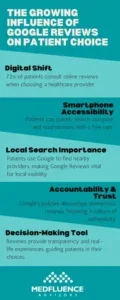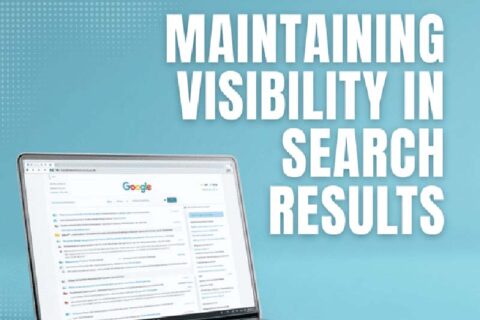Google Reviews and Their Impact on Patient Acquisition

Patient acquisition is more than just about offering excellent healthcare services nowadays. With the rise of digital marketing, it’s also about building trust and credibility online. Patients increasingly turn to the internet for healthcare information, the reputation of a medical practice can be influenced by what they find online—especially in the form of reviews. Among the various platforms where patients can share their experiences, Google Reviews stands out as a critical tool that can shape the perception of healthcare providers.
With Google being the go-to search engine for most people, patients frequently look at reviews to help make informed decisions about their care. Whether they are looking for a family doctor, a specialist, or urgent care, prospective patients often rely on reviews to gauge the quality of care they are likely to receive. This reliance has made Google Reviews a vital factor in the patient acquisition process for healthcare providers.
Explore how the growing role of Google Reviews in the healthcare industry and significantly impact a practice’s ability to attract and retain patients.
The Rise of Google Reviews in Healthcare

The prominence of Google Reviews in healthcare has surged over the past decade, becoming one of the most influential factors for patients when choosing a provider. In the past, recommendations from family and friends were the primary sources for selecting a healthcare practitioner. While personal referrals still matter, online reviews have rapidly become the digital equivalent, with Google Reviews leading the charge. In fact, studies suggest that as many as 72% of patients consult online reviews when choosing a healthcare provider, with Google Reviews accounting for a significant portion of these searches.
Several factors have contributed to this shift.
- First, the widespread use of smartphones has made it easy for patients to search for healthcare providers, compare them, and read reviews all within a few minutes. With Google being the default search engine for most users, it has integrated review features directly into search results, making patient feedback more accessible. This integration means that a potential patient looking for, say, a cardiologist in their area, is likely to see the star ratings and patient comments from Google Reviews even before visiting a clinic’s website.
- In addition, Google Reviews provide immediate and localized feedback. This is particularly crucial in healthcare, where geographic location often influences decision-making. By simply typing “doctor near me,” patients are met with a list of practitioners in their area, along with star ratings and reviews, all visible on the same screen. This local search function has made it easier for patients to compare healthcare providers in their immediate vicinity based on their Google Reviews.
- The transparency and easy access to reviews have also built a culture of trust around Google Reviews. Unlike some other platforms, Google discourages anonymous reviews, adding a layer of accountability that patients appreciate. This sense of authenticity can often outweigh advertising or other forms of marketing, as potential patients value the experiences of others who have received care at a given practice.
- With healthcare being such a personal and often high-stakes decision, patients are drawn to reviews that reflect detailed and real-life experiences. As a result, Google Reviews are becoming not only a research tool but also a first step in the patient acquisition funnel. Practices with a strong collection of positive reviews often stand out in search results, prompting potential patients to explore further, call for appointments, or visit the clinic.
Google Reviews have revolutionized the way patients choose healthcare providers, offering easy access to localized, trustworthy information. As the demand for online reviews continues to grow, healthcare practices that prioritize gathering and managing positive reviews on Google are setting themselves up for better patient acquisition in an increasingly competitive digital landscape.
How Google Reviews Influence Patient Decision-Making
In an era where information is at our fingertips, Google Reviews play a pivotal role in shaping patient decisions. Whether patients are searching for a new primary care physician, a specialist, or a clinic, the reviews left by others serve as a powerful influence on their choices. Understanding how these reviews impact decision-making can help healthcare providers optimize their online reputation and, ultimately, acquire more patients.
At the core of this influence is the psychology of social proof—a concept where people look to others’ actions and experiences to guide their own decisions. In healthcare, where trust is paramount, patients often rely on the experiences of others to determine whether a doctor or practice will meet their needs. A glowing review describing a compassionate doctor who listens to their patients can instill confidence in prospective patients. Conversely, a negative review might raise red flags, leading them to explore other options.
Several key factors shape how Google Reviews influence patient decision-making:
- Star Rating: The star rating is often the first thing people notice when browsing reviews. In healthcare, where the stakes are higher than in other industries, a lower star rating (below 4.0) can immediately deter patients. Providers with higher ratings, typically 4.5 and above, are perceived as more trustworthy and reliable, encouraging potential patients to explore further.
- Volume of Reviews: The number of reviews a practice has is equally important. A practice with hundreds of reviews is seen as more established and experienced than one with only a few. Patients are more likely to trust the consensus of a larger group. A provider with 200 positive reviews gives a stronger impression of consistent care, while a practice with only a handful of reviews might be viewed as untested or lacking credibility.
- Specific Details in Patient Experiences: While star ratings and volume matter, patients often read through the content of reviews to get a sense of the personal experiences others have had. Specifics like waiting time, bedside manner, staff professionalism, and how well the doctor explained medical conditions all play a role in influencing decisions. Reviews that share detailed, positive patient journeys can significantly impact whether a potential patient decides to book an appointment.
By offering transparency into other patients’ experiences, Google Reviews help prospective patients mitigate the uncertainty that comes with choosing a healthcare provider. A consistent pattern of positive feedback builds credibility and trust, both essential factors in healthcare. The more positive and detailed the reviews, the more likely a patient is to pick up the phone or schedule an appointment online.
Ultimately, Google Reviews serve as a modern word-of-mouth referral system. Practices that leverage this digital asset by encouraging satisfied patients to leave reviews can build a strong online reputation that significantly influences patient acquisition.
The Direct Impact on Patient Acquisition
Google Reviews can directly influence the number of patients a healthcare practice acquires. This isn’t just about reputation; it’s about visibility, trust, and conversion. A practice that harnesses the power of Google Reviews positions itself as the go-to option when prospective patients are searching for healthcare providers in their area.
First and foremost, positive Google Reviews help improve a practice’s local search ranking. Google’s algorithm favors businesses with higher ratings, a greater number of reviews, and recent feedback. This means that a healthcare provider with more positive reviews is more likely to appear at the top of search results when patients search for terms like “best pediatrician near me” or “top-rated dentist in [city].” Being visible in Google’s Local Pack—the highlighted map and list of top businesses for local searches—gives practices a significant competitive advantage, increasing the likelihood that a potential patient will click on their listing.
Beyond visibility, Google Reviews play a critical role in converting website visitors into patients. When a potential patient clicks on a healthcare provider’s Google listing, the first thing they see is often the reviews section. Practices with strong, positive reviews make a good first impression, building immediate trust. Patients are more likely to schedule an appointment with a provider that has a five-star rating and reviews highlighting excellent care, compassionate staff, and a smooth overall experience.
There are plenty of real-world examples that demonstrate how Google Reviews have boosted patient acquisition for healthcare providers. Consider a small family practice that wasn’t generating many new patient inquiries. After focusing on improving their Google Reviews by asking satisfied patients to leave feedback, they saw a dramatic increase in website traffic and appointment bookings. Their star rating increased from 3.8 to 4.6, and the practice started appearing at the top of local search results. Within a few months, new patient inquiries increased by over 30%.
In addition to improving search ranking and conversions, Google Reviews also enhance a practice’s credibility. In an industry where word-of-mouth is critical, a collection of recent, positive reviews acts as a form of social proof that assures potential patients they are making the right choice. As more patients leave feedback, this positive cycle continues, driving even more patient inquiries and boosting overall patient acquisition.
Negative Reviews: Damage Control and Learning Opportunities
While positive reviews can significantly boost patient acquisition, negative reviews can have the opposite effect. For healthcare providers, negative feedback isn’t just a blow to their online reputation—it can actively deter prospective patients from booking an appointment. However, with the right approach, even negative reviews can be an opportunity to improve and build trust.
First, it’s essential to recognize that no practice is perfect, and every provider will face negative reviews at some point. What matters is how a practice responds to these reviews. A well-crafted, professional response to negative feedback can demonstrate to potential patients that the practice values patient satisfaction and is committed to addressing concerns. When patients see that a practice takes the time to engage with critical feedback, it can actually enhance trust and soften the blow of a negative review.
Here are some tips for effectively handling negative reviews:
- Respond promptly: Timing is critical. Responding to a negative review within 24-48 hours shows that the practice is attentive and values patient feedback.
- Remain professional: While negative reviews can sometimes feel personal, it’s crucial to respond professionally. Thank the patient for their feedback, acknowledge their experience, and offer to discuss the issue further offline. This approach helps prevent a public back-and-forth and shows prospective patients that the practice is solution-oriented.
- Use feedback for improvement: Negative reviews often highlight areas where the practice can improve, such as long wait times, lack of communication, or unfriendly staff. Use these reviews as learning opportunities to identify patterns and make necessary changes.
There are even cases where negative reviews, when handled properly, can turn into positive experiences for both the patient and the practice. For instance, a patient who had a less-than-stellar experience with a long wait time might leave a negative review. If the practice addresses the issue by implementing a new scheduling system and follows up with the patient, they may update their review to reflect the positive resolution. This demonstrates to others that the practice is willing to adapt and prioritize patient satisfaction.
Ignoring negative reviews, on the other hand, can be detrimental. Potential patients might see unresolved complaints as a red flag, especially in a field as personal as healthcare. Negative feedback left unaddressed may also hurt local SEO performance, as Google factors in both review content and responsiveness when determining rankings.
By handling negative reviews with care and using them as opportunities for improvement, healthcare providers can mitigate their impact on patient acquisition and maintain a strong, trustworthy online presence.
Encouraging Positive Google Reviews
One of the most effective ways to boost patient acquisition through Google Reviews is by actively encouraging satisfied patients to leave feedback. While it’s common for unhappy patients to leave reviews, happy patients may not always think to do so unless prompted. Encouraging positive reviews can help practices build a more robust online reputation, leading to higher visibility and more patient inquiries.
There are several simple, ethical strategies healthcare providers can use to encourage more positive Google Reviews:
- Ask directly: Often, the best way to get reviews is to simply ask. After a successful visit, the doctor or staff can politely ask patients if they’d be willing to leave a Google Review. Many patients are happy to share their positive experiences when asked.
- Send follow-up emails or texts: Automated follow-up emails or text messages are another effective way to encourage reviews. Practices can send a message shortly after a patient’s visit, thanking them for coming in and asking if they’d like to share their experience on Google. Including a direct link to the review page makes the process easy for patients.
- Leverage patient satisfaction surveys: Many practices already send satisfaction surveys after appointments. By integrating a simple question asking patients if they’d be willing to leave a Google Review, practices can streamline the process and gather more feedback.
- Create a seamless experience: Practices should aim to provide exceptional service from start to finish, as a positive experience naturally leads to positive reviews. Happy patients are much more likely to leave glowing reviews when they feel cared for, respected, and heard.
It’s important to note that while encouraging reviews is good practice, incentivizing reviews with gifts or discounts can be seen as unethical and is against Google’s guidelines. Reviews should always be authentic and reflect real patient experiences.
Timing also plays a crucial role in encouraging reviews. The best time to ask for a review is shortly after the patient’s visit, while their experience is still fresh in their mind. This can be at the end of the appointment, via a follow-up email, or even through a patient portal.
By actively seeking out positive reviews, healthcare providers can build a robust online reputation that helps them stand out in local searches. The more positive reviews a practice accumulates, the more appealing it becomes to potential patients searching for a trusted provider.
When managed correctly, Google Reviews become a key tool in building trust and driving patient acquisition.
Harness the Power of Google Reviews for Patient Acquisition

There’s no denying that Google Reviews have become a critical component of patient acquisition strategies for healthcare providers. With prospective patients relying heavily on the experiences of others, maintaining a robust online reputation is essential for standing out in a crowded marketplace.
Positive reviews not only enhance visibility in local search results but also instill trust and confidence in potential patients. Conversely, effectively managing negative reviews provides opportunities for growth and demonstrates a commitment to patient satisfaction.
Healthcare providers who actively encourage satisfied patients to leave feedback can create a cycle of positive reinforcement that attracts more patients and enhances their practice’s credibility. By understanding the dynamics of patient decision-making influenced by reviews, practices can leverage this knowledge to optimize their strategies for growth and success.
Don’t miss out on the opportunity to attract new patients and enhance your reputation in the community!


